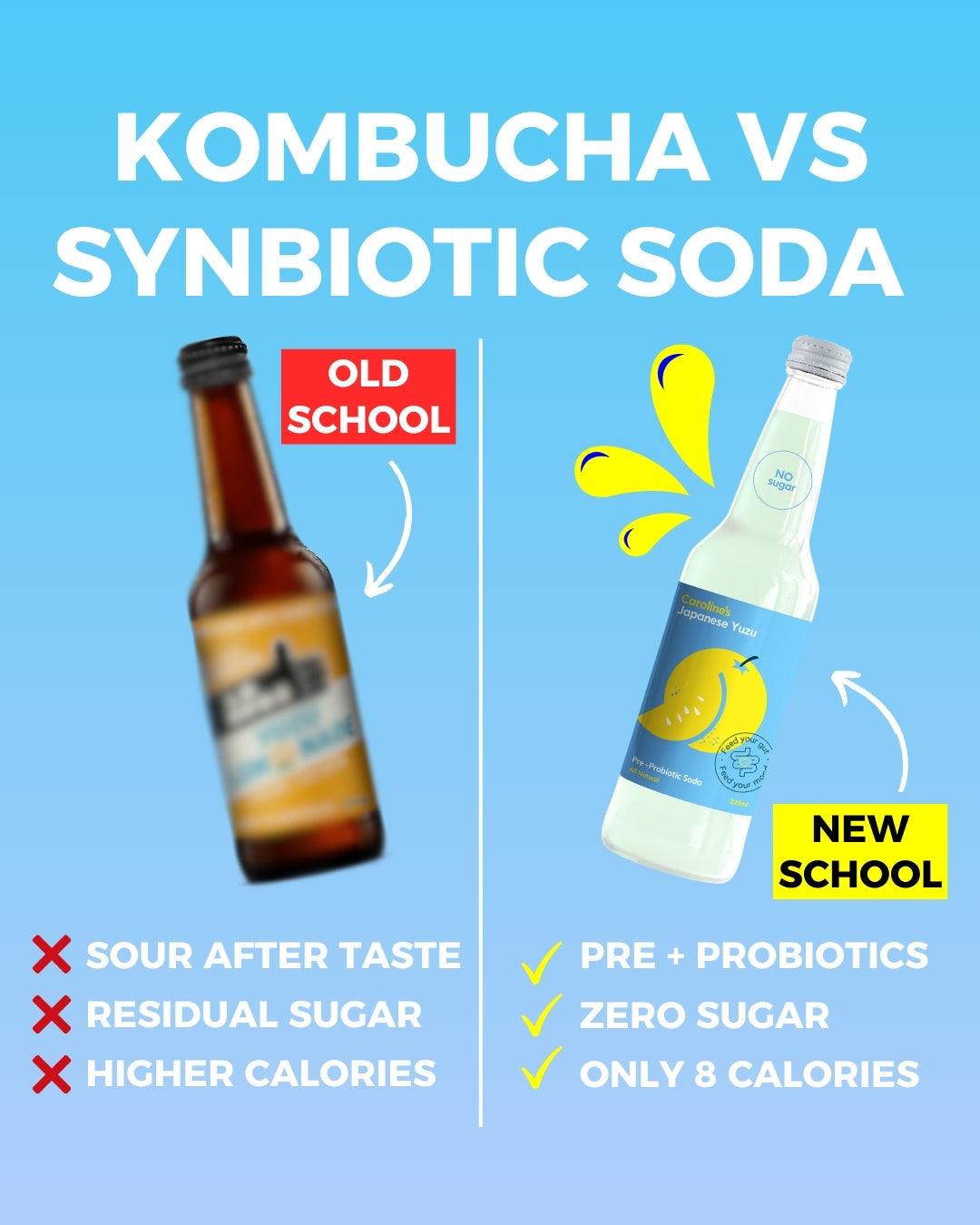
Prebiotic Soda vs Kombucha: Which Is Better for Gut Health?
Share
Prebiotic Soda vs Kombucha: Which Is Better for Gut Health?
Prebiotic Soda vs Kombucha
Gut health is one of the fastest-growing wellness trends in Australia. From supermarket shelves to café menus, functional drinks like kombucha and prebiotic soda are everywhere. But which one is actually better for your health? Let’s break down the differences.
What Is Prebiotic Soda?
Prebiotic sodas are sparkling drinks infused with prebiotic fibres such as chicory root, inulin, or apple cider vinegar. Prebiotics act as fuel for probiotics — the “good bacteria” in your gut.
Unlike kombucha, prebiotic sodas are usually zero sugar, low in calories, and designed to taste like a refreshing soft drink while supporting digestion.
👉 Caroline's Pre + Probiotic Sodas for example, uses a synbiotic blend (prebiotics + probiotics + apple cider vinegar) to give your gut extra support without the sour aftertaste of kombucha.
What Is Kombucha?
Kombucha is a fermented tea made with sugar, yeast, and bacteria (SCOBY). During fermentation, natural probiotics are created, giving kombucha its tangy flavour.
While kombucha does provide probiotics, it often still contains residual sugar (to feed fermentation) and can have higher calories compared to prebiotic soda.
Benefits of Prebiotic Soda
- Zero sugar, low calories – Great for anyone managing weight or reducing sugar intake.
- Gut health support – Feeds the probiotics you already have in your digestive system.
- Tastes familiar – Flavours like raspberry, passionfruit, or yuzu make it easy to swap soft drinks for something healthier.
- Accessibility – Shelf-stable and available in supermarkets across Australia.
Benefits of Kombucha
- Live probiotics – Delivers beneficial bacteria directly to the gut.
- Antioxidants from tea – Fermented tea retains polyphenols, which support overall wellness .
- Variety of flavours – From ginger to berry, kombucha comes in many artisan varieties.
Prebiotic Soda vs Kombucha: Which One Should You Choose?
Taste & Calories
- Kombucha has a vinegary, tangy taste, which some people love, while others find too sour.
- Prebiotic soda tastes like a light, fruity soft drink — but with under 11 calories and no sugar.
Sugar Content
- Kombucha often contains 3–8g of sugar per serve .
- Prebiotic sodas like Caroline’s contain no added sugar, making them guilt-free.
Gut Health
- Kombucha provides live probiotics.
- Prebiotic soda delivers prebiotics + probiotics (synbiotics) to support digestion and balance.
Final Thoughts
Both kombucha and prebiotic soda can be part of a healthy lifestyle. If you prefer a tangy, fermented flavour and don’t mind some sugar, kombucha could be for you. But if you want a refreshing, zero-sugar option with gut health benefits — prebiotic soda is the modern upgrade.
Caroline’s Drinks combines prebiotics, probiotics, and apple cider vinegar into every bottle, making it a smarter swap for kombucha or soft drinks.
References
- Healthline. Kombucha: Health Benefits and Risks. (2023).
- Cleveland Clinic. What Is Kombucha and Is It Good for You? (2022).
- WebMD. Kombucha Nutrition Facts and Health Benefits. (2021).
Blog Written By: Steve Barko Digital Marketing
